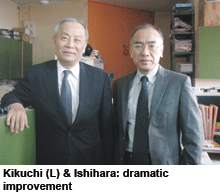 Renya Kikuchi and Masao Ishihara are the chairman and president of the Yokohama (Japan)-based Learning Systems Co Ltd (LSC, annual revenue: Rs.20 crore) which designs and markets customised STEM (science, technology, engineering, maths) learning software, robotics kits and IT equipment. In 2010, it registered a subsidiary, LS Creative Learning Pvt. Ltd (LSCL) in Chennai.
Renya Kikuchi and Masao Ishihara are the chairman and president of the Yokohama (Japan)-based Learning Systems Co Ltd (LSC, annual revenue: Rs.20 crore) which designs and markets customised STEM (science, technology, engineering, maths) learning software, robotics kits and IT equipment. In 2010, it registered a subsidiary, LS Creative Learning Pvt. Ltd (LSCL) in Chennai.
Newspeg. Kikuchi and Ishihara were recently in India to review the operations of their Indian subsidiary.
Direct talk. “We offer robotics-based K-12 education. We have found robotics-driven learning which challenges children to build robots empl-oying physics, maths and IT concepts and principles, dramatically improves their knowledge and understanding of these subjects,” says Kikuchi, also founder chairman of the Tokyo-based IM Corporation, an entrance exams and test preparation company which owns over 70 jukku (coaching schools) across Japan.
Progress report. LSC’s hands-on sciences learning systems priced at Rs.800-1,600 per month per child — including robotic kits, trained on-site teacher, software and laptops, if required — have generated considerable enthu-siasm within India’s upscale private sector schools which are leading the primary-secondary education sector’s gradual transition from memory-based and chalk-n-talk pedagogies to cognitive learning. Among the first to sign up for LSC/LSCL’s (voluntary) learning packages was Candor International, Bangalore followed by the IB (Geneva)-affiliated Indus International School, ranked the country’s second most respected inter-national school in Education-World India’s Most Resp-ected Schools Survey 2011. Currently over 500 students in the three Indus Inter-national schools (Bangalore, Hyderabad and Pune) have signed up for LSCL’s robo-tics-centred Wonder STEM programme, for which the company has established special on-campus robotics labs.
Unique selling proposition. According to Ishihara, a liberal arts and science graduate of the International Christian University, Tokyo and Boston Univ-ersity Graduate School of Management, the company has drawn upon the research and expertise of several globally renowned robotics and hands-on education corporations and institutions to design LSC’s robotics-centred, school-customised STEM curriculums “to prepare the next gener-ation to solve unforeseen problems”. Among them: the Robokor and Robomation corporations (Korea); J.S. Robotics and Saitama University (Japan), and CEEO of Tufts University (USA). “Constructionism rather than instructionism is the driving philosophy of LSC and LSCL,” says Ishihara.
Future plans. Buoyed by the enthu-siastic reception given to LSC’s education system and services by India’s top-ranked schools, Ishihara is optimistic about the future of LSCL in India’s “huge and high-potential primary-secondary education sector”. “The initial feedback that our robotics kits and curricula have received is excellent. We have introduced our products and systems in four schools in three states across the country. In the next academic year beginning June, we have budgeted to add ten more to our list of clients. We are here to revive India’s ancient traditions of excellence in STEM subjects,” he says.
Given India’s sliding reputation in science and maths subjects, that’s a welcome helping hand.
Dilip Thakore (Bangalore)